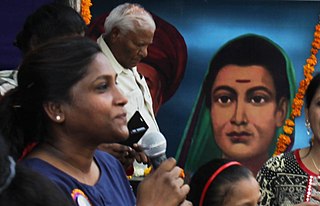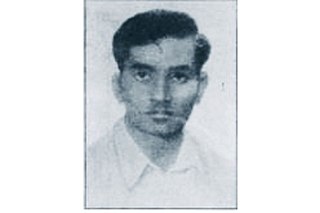Related Research Articles

Dalit is a term first coined by the Indian social reformer Jyotirao Phule for untouchables and outcasts, who represented the lowest stratum of the castes in the Indian subcontinent. Dalits were excluded from the fourfold varna of the caste hierarchy and were seen as forming a fifth varna, also known by the name of Panchama. Several scholars have drawn parallels between Dalits and the Burakumin of Japan, the Baekjeong of Korea and the peasant class of the medieval European feudal system.
All India Democratic Women's Association (AIDWA) is a women's organisation committed to achieving democracy, equality and women's emancipation. It has an organizational presence in 23 states in India, with a current membership of more than 11 million. About two-thirds of the organisation's strength is derived from poor rural and urban women. It was founded in 1981 as a national level mass organisation of women. It is also the women's wing of the Communist Party of India (Marxist).
National Campaign on Dalit Human Rights (NCDHR), founded in 1998, now comprises four operational strands, each of which is working to eradicate caste-based discrimination against Dalits in India. It is based in Delhi and has chapters elsewhere in the country. It has stated its aims to be achieving greater visibility for Dalit issues and holding the state, in the form of its criminal justice system, accountable for its alleged failures.
Ruth Manorama is a Dalit social activist from Bangalore, India who fights for Dalit women's rights, the rights of domestic workers and those in the unorganized labour sector, as well as urban slum dwellers. In 2006, she was awarded the Right Livelihood Award.

Gail Omvedt was an American-born Indian sociologist and human rights activist. She was a prolific writer and published numerous books on the anti-caste movement, Dalit politics, and women's struggles in India. Omvedt was involved in Dalit and anti-caste movements, environmental, farmers' and women's movements, especially with rural women.
Ali Anwar Ansari is an Indian journalist, social activist and politician. He is the founder of Pasmanda Muslim Mahaz, concerned with fighting discrimination against lower-caste and Dalit Muslims.

Sukhadeo Thorat an Indian economist, educationist, professor and writer. He is the former chairman of the University Grants Commission. He is professor emeritus in Centre for the Study of Regional Development, Jawaharlal Nehru University. He is an expert on B. R. Ambedkar.
The politics of Bihar, an eastern state of India, is dominated by regional political parties. As of 2021, the main political groups are Rashtriya Janata Dal (RJD), Bharatiya Janata Party (BJP), Janata Dal (United) (JDU), Indian National Congress (INC), Left Front, Lok Janshakti Party (LJP), Hindustani Awam Morcha (HAM). There are also some smaller regional parties, including Samata Party, Hindustani Awam Morcha, Rashtriya Jan Jan Party, Rashtriya Lok Janata Dal, Jan Adhikar Party and Vikassheel Insaan Party, Lok Janshakti Party and Rashtriya Lok Janshakti Party, which play a vital role in politics of state. As of 2024, Bihar is currently ruled by NDA, after JDU break out from Mahagatbandhan (Grandalliance) coalition and returned to NDA fold.
National Alliance of People's Movements is an alliance of alter-globalisation activist groups in India. It is an umbrella organisation for various civil society organisations and individuals working towards similar goals.

Thenmozhi Soundararajan is an Indian American Dalit rights activist based in the United States of America. She is also a transmedia storyteller, songwriter, hip hop musician and technologist. She has been actively campaigning for the rights of the marginalized in the midst of structural casteism. She is the founder of Equality Labs, the largest Dalit civil rights organization in the United States. Soundararajan is known for her advocacy work against caste discrimination in the United States and India, and for her contributions to the field of media and technology justice. She has co-authored reports on hate speech and disinformation on social media, and has spoken out against caste-based harassment in the tech industry. Soundararajan's book "The Trauma of Caste" explores the intersection of caste, gender, and mental health, and advocates for the recognition and healing of caste soul wounds as a prerequisite for caste abolition. She has also been involved in art and storytelling projects, including the creation of the #DalitWomenFight movement and the curation of Dalit History Month.

Asha Kowtal is an activist and expert in the field of Dalit women’s rights. She is the Former General Secretary of the Dalit Women’s Rights movement in India, called the All India Dalit Mahila Adhikar Manch (AIDMAM), which is part of the National Campaign on Dalit Human Rights. She is also a convenor and part of the steering committee of WinG-India, a network advancing leadership of women from the north-eastern part of India, and involving Dalit and tribal communities in governance at all levels with the aim of challenging exploitative structures and enabling a society with gender equality.

Jignesh Mevani is an Indian politician, lawyer, activist and former journalist serving as the representative of the Vadgam constituency in the Gujarat Legislative Assembly since 2017. He is a member of the Indian National Congress party. He is the convener of the Rashtriya Dalit Adhikar Manch (RDAM).
In July 2016, seven members of a Dalit family were assaulted by a group of people in pretext of cow protection in Una in Gujarat, India. The video of the incident was circulated on the social media resulting in statewide protests in following months. Forty-three people including four Gujarat Police officers were arrested and the case is under trial since August 2018.

Manjula Pradeep is an Indian human rights activist and a lawyer. She is the former Executive Director of Navsarjan Trust, one of the largest Dalit rights organizations in India, addressing the issues of caste discrimination and gender based discrimination.
Sanghapali Aruna, also known as Sanghapali Aruna Lohitakshi, is a human rights activist from India, best known for her work on Dalit women's rights. She is the Executive Director of Project Mukti.

Dalit feminism is a feminist perspective that includes questioning caste and gender roles among the Dalit population and within feminism and the larger women's movement. Dalit women primarily live in South Asia, mainly in Bangladesh, India, Nepal and Pakistan. Dalit women face different challenges than women in oppressor castes in these countries. They are more likely to be poor, uneducated and socially marginalized. Dalit feminists advocate and have advocated for equal rights for Dalit women based on gender, caste and other issues. They have addressed conferences, created organizations and helped elect other Dalit women into political office.

Dalit History Month is an annual observance as a way of remembering important people and events in the history of the Dalits or Scheduled Castes and Scheduled Tribes. It is celebrated in April all over the world by Ambedkarites, followers of Dr. B.R. Ambedkar. Discussions, storytelling, history projects, special publications in media, and art works are organized during this month. The Canadian Province of British Columbia recognized April as Dalit History Month.

Jagdish Mahto was an Indian communist activist. He was a naxal leader who led the 1970 Bhojpur uprising in the landlord-dominated Bhojpur region of Bihar. He was a member of the Communist Party of India (Marxist–Leninist), an organisation which was leading the Naxalite insurgency against the Government of India. He also fought against the upper-caste landlords for the cause of lower-caste people. Mahto, also called Master Saheb, was a member of the Bihar State Committee of CPI(M–L) and one of the founding leaders of the party in Bhojpur.
Nodeep Kaur is an Indian Dalit labour rights activist and member of the Mazdoor Adhikar Sangathan (MAS), one of the unions of industrial workers actively supporting the 2020–2021 Indian farmers' protest. Kaur was arrested from the Kundli Industrial Area by the Haryana Police on 12 January 2021 and had FIRs filed against her on a wide range of sections including unlawful assembly, assault and criminal force, trespass, extortion, snatching, criminal intimidation, and attempt to murder, based on statements made by a police inspector and the accountant of the company that had failed to pay protesting workers’ wages. She was allegedly beaten and sexually assaulted while in police custody. According to Kaur's lawyer, a medical report ordered after Kaur's arrest revealed wounds that pointed to a sexual assault.

Dalits in Bihar are a social group composed of many Scheduled Castes, placed at the bottom of the "caste-based social order". The Dalits also include some of the erstwhile untouchable castes, who suffered various forms of oppression in the feudal-agrarian society of Bihar. Some of the Dalit castes have specific cultural practices, which differ from those of orthodox Hinduism.
References
- ↑ "Asha Kowtal" (PDF). Retrieved 28 May 2016.
- 1 2 3 4 Banerji, Mahika (2017-11-23). "Interview With Anju Singh From AIDMAM". Feminism In India. Retrieved 2018-08-13.
- ↑ "'Untouchability Is an Instrument in the Hands of the Upper Castes'". Tehelka. 30 October 2012. Archived from the original on 14 August 2018. Retrieved 13 August 2018.
- ↑ Nair, Shalini (2018-06-19). "Dalit women's rights activists to present accounts of caste violence at UNHRC". The Indian Express. Retrieved 2018-08-13.
- ↑ "Dalit women's self-respect yatra" . Retrieved 28 May 2016.
- ↑ Mitra, Ritwika (24 June 2018). "Dalit women to march across seven Haryana districts against caste violence". The New Indian Express. Retrieved 2018-08-13.
- ↑ Ratnam, Dhamini (2018-06-22). "Dalit women's group bats for rights at United Nations forum". Hindustan Times. Retrieved 2018-08-13.
- ↑ Masoodi, Ashwaq (2018-07-18). "Dalit women are brewing their own social revolution". Live Mint. Retrieved 2018-08-13.
- ↑ "Connecting the movements for Dalit and Black lives - The Seattle Globalist". The Seattle Globalist. 2015-10-22. Retrieved 2018-09-09.
- ↑ "#DalitWomenFight Brings Fight Against Caste-Based Violence to U.S." NBC News. Retrieved 2018-09-09.